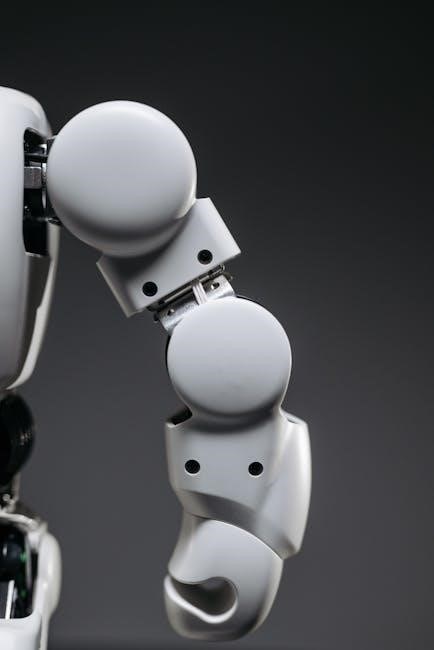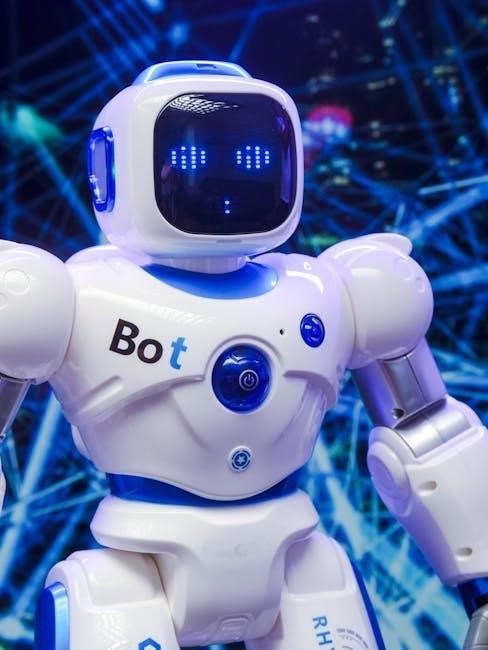Advanced artificial intelligence represents a transformative field, enabling machines to simulate human intelligence, adapt, and learn. It drives innovation across industries, addressing complex challenges and reshaping futures.
1.1 Definition and Scope of Advanced AI
Advanced artificial intelligence refers to sophisticated systems capable of simulating human intelligence, adapting to complex environments, and performing tasks requiring reasoning and problem-solving. Its scope encompasses deep learning, neural networks, and autonomous decision-making, enabling transformative applications across industries like healthcare, finance, and agriculture, while addressing societal challenges and driving technological evolution.
1.2 Historical Context and Evolution of AI
Artificial intelligence traces its roots to the 1956 Dartmouth Conference, where the term was coined. Early advancements focused on rule-based systems, followed by the rise of machine learning in the 21st century. The evolution of AI has been marked by breakthroughs in neural networks, deep learning, and autonomous systems, leading to its current transformative impact across industries and society.
Key Technologies in Advanced Artificial Intelligence
Advanced AI relies on machine learning, deep learning, and neural networks to enable intelligent systems. These technologies drive innovation, powering applications like natural language processing and autonomous systems.
2.1 Machine Learning and Deep Learning
Machine learning and deep learning are cornerstone technologies in advanced AI, enabling systems to learn from data and improve over time. Deep learning, with its layered neural networks, excels in complex pattern recognition, driving innovations in image and speech recognition, natural language processing, and predictive analytics, thus advancing AI capabilities across industries.
2.2 Neural Networks and Their Applications
Neural networks, inspired by the human brain, are pivotal in advanced AI, offering robust solutions for data processing and decision-making. Their applications span healthcare diagnostics, financial forecasting, and autonomous systems, enabling precise pattern recognition and predictive capabilities that drive innovation and efficiency across diverse sectors.

Applications of Advanced Artificial Intelligence
Advanced AI transforms industries through intelligent systems, enhancing healthcare diagnostics, optimizing financial markets, and revolutionizing sustainable agriculture, enabling innovative solutions across diverse sectors.
3.1 AI in Healthcare and Medical Research
AI revolutionizes healthcare by enhancing diagnostics, optimizing treatment plans, and accelerating medical research. It enables early disease detection, streamlines clinical workflows, and supports personalized medicine, improving patient outcomes and reducing costs effectively.
3.2 AI in Finance and Market Analysis
AI transforms finance by enabling predictive analytics, algorithmic trading, and risk management. It analyzes vast datasets to forecast market trends, detect anomalies, and optimize investment strategies, providing actionable insights for better decision-making and operational efficiency.
3.3 AI in Sustainable Agriculture
Advanced AI enhances sustainable agriculture by optimizing crop yields, reducing resource consumption, and minimizing environmental impact. AI-driven systems analyze soil, weather, and crop health to provide precise farming recommendations. These technologies enable smarter irrigation, pest control, and fertilizer use, promoting eco-friendly practices and ensuring food security for a growing global population while preserving natural resources.

Ethical Considerations in Advanced AI
Advanced AI raises critical ethical concerns, including privacy, bias, and accountability. Ensuring transparency, fairness, and responsible use of AI is essential to build trust and mitigate risks.
4.1 Privacy Concerns and Data Security
The rapid advancement of AI has heightened concerns about data privacy and security. As AI systems process vast amounts of personal data, ensuring confidentiality and preventing unauthorized access becomes critical. Major tech companies are exploring advanced solutions, including nuclear energy for powering data centers, to enhance security and efficiency. Robust frameworks are essential to safeguard sensitive information and maintain public trust in AI technologies.
4.2 Bias and Fairness in AI Systems
Ensuring fairness and eliminating bias in AI systems is crucial for ethical deployment. AI technologies must be designed to avoid discrimination and ensure equitable outcomes. Researchers are developing advanced methods to identify and mitigate biases, fostering trust and transparency. Addressing these issues is essential for the responsible advancement of AI across various industries and applications.

Environmental Impact of Advanced AI
Advanced AI significantly impacts the environment through high energy consumption and emissions. Sustainable solutions, including renewable energy, are being explored to reduce its carbon footprint.
5;1 Energy Consumption by AI Data Centers
AI data centers consume significant energy, driving demand for sustainable power solutions. As AI adoption grows, the environmental impact of energy consumption becomes a critical focus for innovation and regulation.
5.2 Role of Nuclear Energy in AI Infrastructure
Nuclear energy is emerging as a crucial power source for AI infrastructure, offering stable and scalable energy to meet the growing demands of data centers. It provides a low-carbon alternative, addressing environmental concerns while supporting the computational needs of advanced AI technologies.
Future of Advanced Artificial Intelligence
Advanced AI promises transformative potential, with emerging trends like general AI and quantum computing poised to revolutionize industries and tackle complex global challenges.
6.1 Emerging Trends in AI Development
Emerging trends in AI development include advancements in general AI, quantum computing integration, and ethical AI frameworks. Innovations like deep learning optimization and neural network enhancements are accelerating progress, enabling machines to perform complex tasks with greater efficiency and accuracy, while addressing societal challenges through sustainable and responsible AI practices.
6.2 AI-Driven Innovation in Societal Challenges
AI-driven innovation is transforming societal challenges by enhancing healthcare accessibility, optimizing resource use, and advancing sustainable practices. Technologies like deep learning and natural language processing enable smarter solutions, addressing issues such as climate change and education disparities. This fosters collaboration across sectors, driving meaningful progress and creating a pathway toward a more equitable and technologically advanced future.

Global Leadership in Advanced AI
Leading countries in AI research include the US, China, and EU nations, driving innovation through significant investments and collaboration, fostering global competition and advancements.
7.1 Leading Countries in AI Research and Development
The United States, China, and European Union are at the forefront of AI research and development, investing heavily in innovation. These regions foster collaboration between academia and industry, driving technological advancements. Their efforts focus on creating ethical frameworks and promoting global standards to ensure responsible AI growth and international competitiveness in the digital age.
7.2 Role of Major Tech Companies in AI Advancement
Major tech companies like Google, Microsoft, and Amazon are spearheading AI innovation through significant investments in research and development. They develop cutting-edge technologies, such as advanced neural networks and quantum computing, driving progress in AI capabilities. Their initiatives accelerate industry transformation and pave the way for future advancements in artificial intelligence across various sectors globally.

Integration of Advanced AI with Other Technologies
Advanced AI integrates with technologies like IoT, blockchain, and robotics, creating synergies that enhance efficiency and innovation, driving transformative solutions across industries and fostering interconnected systems.
8.1 AI and Blockchain: Synergistic Opportunities
Advanced AI and blockchain technologies complement each other, enhancing security, transparency, and efficiency. AI optimizes blockchain operations, while blockchain provides a secure framework for AI data sharing and model training, enabling decentralized solutions across industries like finance, healthcare, and supply chains, fostering trust and innovation.
8.2 AI and IoT: Transforming Industries Together
The integration of advanced AI and IoT enables intelligent automation, enhancing data processing and decision-making. AI-driven IoT systems optimize operations in smart cities, healthcare, and manufacturing, offering real-time insights and predictive maintenance. This synergy fosters innovation, improves efficiency, and drives sustainable solutions across industries, revolutionizing how devices and systems interact and perform.

Impact of Advanced AI on the Workforce
Advanced AI reshapes the job market, automating tasks and creating new roles, requiring continuous skill adaptation and fostering lifelong learning to stay relevant in evolving industries.
9.1 Job Market Shifts Due to AI Adoption
Advanced AI adoption is reshaping the job market, with automation replacing routine tasks and creating new roles. Workers are transitioning across occupations, driven by AI’s complementarity and exposure levels. This shift demands skill adaptation and lifelong learning to remain relevant. Industries are evolving, requiring employees to embrace new technologies and explore emerging opportunities in an AI-driven economy.
9.2 Lifelong Learning and Skill Development
Lifelong learning is crucial in an AI-driven economy, as workers must adapt to new technologies. Educational systems are evolving to include advanced AI-related courses, fostering skills in data analysis and algorithm development. Continuous skill development ensures professionals remain competitive, driving innovation and addressing societal challenges effectively in a rapidly changing job market.

Advanced AI in Space Exploration
Advanced AI enhances space missions by enabling autonomous systems, data analysis, and decision-making. It optimizes operations, from navigation to resource allocation, driving innovation in space research and exploration.
10.1 AI-Driven Missions and Research
AI-driven missions leverage advanced algorithms to enhance space exploration efficiency. By enabling autonomous decision-making and real-time data analysis, AI optimizes mission planning, reduces errors, and improves accuracy in space research.
10.2 Enhancing Space Technologies with AI
AI significantly enhances space technologies by improving spacecraft navigation, optimizing resource allocation, and enabling predictive maintenance. Advanced AI systems facilitate better communication, data processing, and anomaly detection, ensuring safer and more efficient space exploration and research.

Challenges and Limitations of Advanced AI
Advanced AI faces challenges like computational demands, energy consumption, and regulatory complexities, impacting scalability and environmental sustainability while requiring robust governance frameworks.
11.1 Technical and Computational Barriers
Advanced AI faces significant technical challenges, including computational demands, energy consumption, and algorithmic complexity. High-performance hardware and efficient models are essential to address scalability and real-world application limitations.
11.2 Regulatory and Ethical Challenges
Regulatory and ethical issues pose significant hurdles for advanced AI. Ensuring privacy, mitigating bias, and addressing accountability are critical. Stricter policies and ethical frameworks are needed to guide responsible AI development and deployment;
Advanced AI holds immense potential to transform industries and societies, balancing innovation with ethical considerations to ensure responsible development and deployment for a sustainable future.
12.1 Summary of Key Insights
Advanced AI represents a transformative force, reshaping industries like healthcare, finance, and agriculture through intelligent systems. While offering vast potential, challenges such as ethical concerns, energy consumption, and workforce impacts must be addressed. Global leadership and innovation are crucial, requiring balanced approaches to ensure responsible development and deployment for societal benefit and sustainable progress.
12.2 Future Outlook for Advanced AI
Advanced AI’s future promises groundbreaking innovations, with emerging trends like enhanced deep learning and ethical frameworks. Global collaboration will drive progress, addressing challenges like energy efficiency and bias. As AI integrates with technologies like blockchain and IoT, its potential to solve societal and environmental issues grows, ensuring a balanced and sustainable technological evolution for future generations.

References and Further Reading
For further exploration, refer to academic papers on AI advancements, industry journals, and online courses. These resources provide in-depth knowledge and practical insights into advanced AI.
13.1 Recommended Research Papers and Articles
Explore foundational papers on AI ethics, workforce transitions, and technological advancements. Key articles highlight AI’s role in healthcare, finance, and sustainable agriculture, offering insights into its societal impact. Google’s Gemini 2.5 and its Deep Think mode are also discussed, showcasing advancements in AI reasoning. Access these resources through academic databases or leading AI journals for a comprehensive understanding of the field.
13.2 Online Resources for Advanced AI
Utilize online platforms like Google’s AI research hub and ScienceDaily for cutting-edge insights. Websites offering AI courses, webinars, and tutorials provide hands-on learning. Explore resources like Gemini 2.5 updates and sustainable agriculture case studies. These platforms cater to professionals and students, fostering a deeper understanding of advanced AI technologies and their real-world applications.